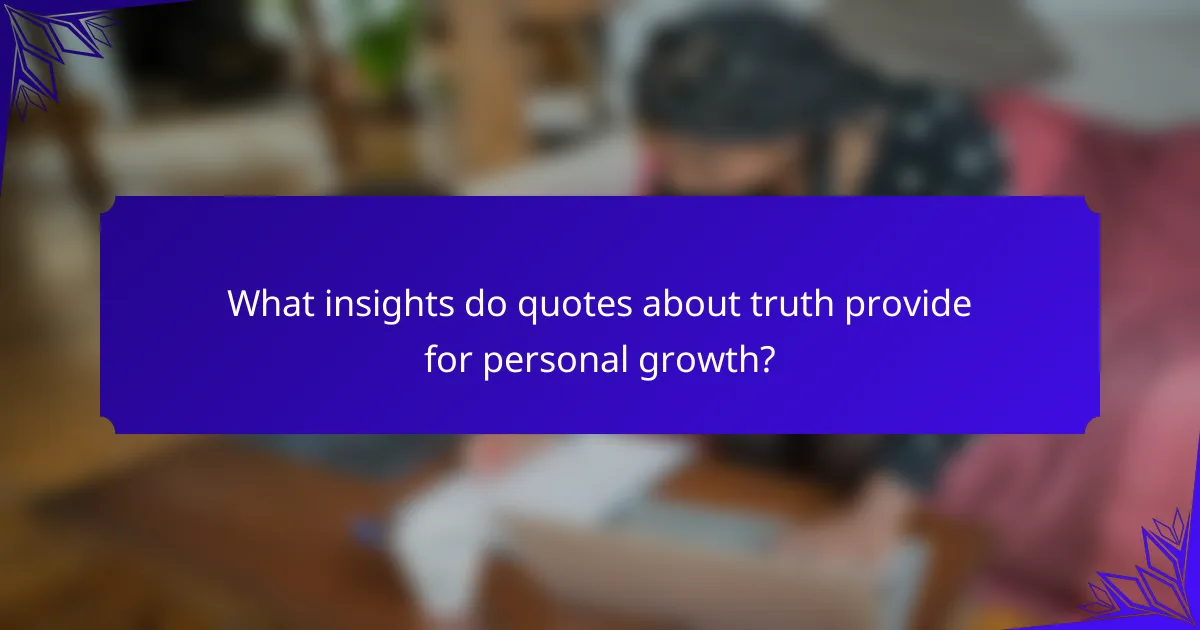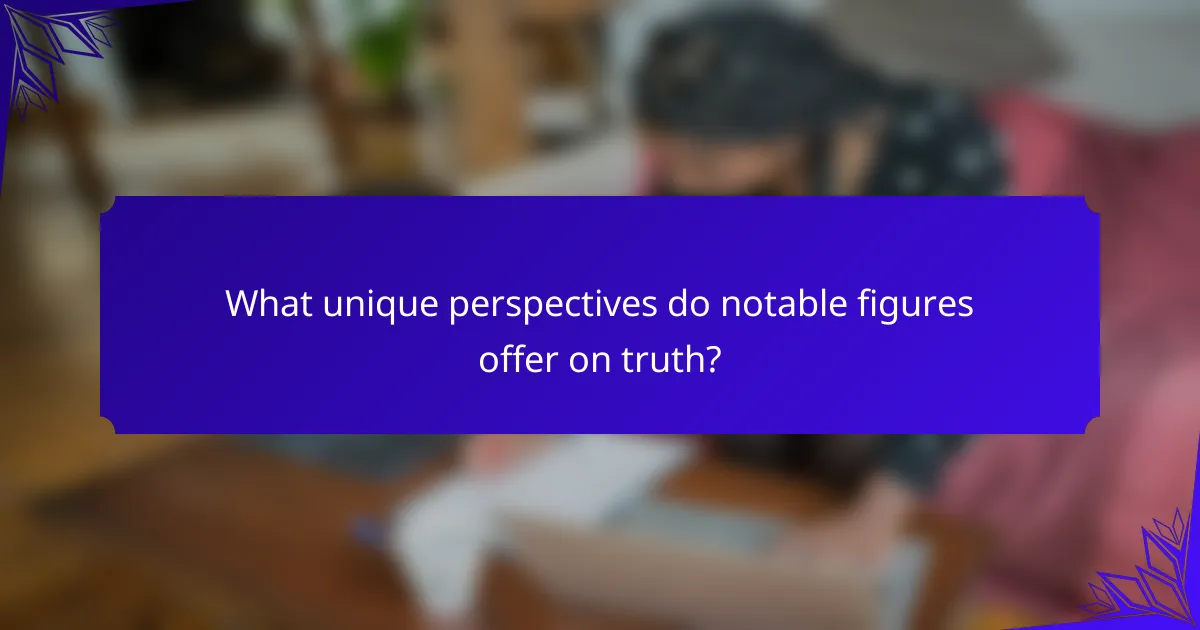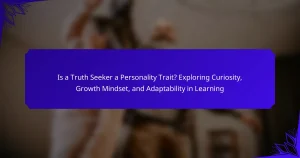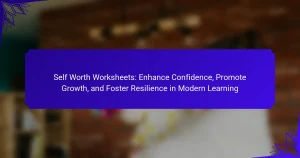Quotes about truth can significantly enhance personal growth and learning. They encourage self-reflection and authenticity while challenging conditioned beliefs. Insights from notable figures reveal truth’s complexity and its role in justice and critical thinking. Lesser-known quotes provoke deeper reflection, inspiring individuals to embrace their true selves and navigate today’s complex world.

What insights do quotes about truth provide for personal growth?
Quotes about truth foster personal growth by encouraging self-reflection and authenticity. They challenge individuals to confront their beliefs and biases, leading to deeper understanding. Insights from these quotes often highlight the importance of honesty in relationships and decision-making. Embracing truth can cultivate resilience, as individuals learn to accept reality and adapt accordingly. Ultimately, these insights empower personal development by promoting a mindset focused on growth and learning.
How do quotes shape our understanding of learning and conditioning?
Quotes significantly influence our understanding of learning and conditioning by encapsulating profound truths. They provide concise insights that resonate with personal experiences and universal principles. For instance, “The only real mistake is the one from which we learn,” emphasises the value of failure in the learning process. This perspective encourages individuals to embrace challenges as opportunities for growth, aligning with the core principles of conditioning. Additionally, quotes often serve as reminders of the importance of resilience and adaptability, essential traits in both learning and conditioning contexts. By reflecting on these insights, individuals can cultivate a deeper appreciation for the transformative power of knowledge and experience.
What are the core themes found in quotes about truth?
Quotes about truth often emphasise the importance of authenticity, self-awareness, and the pursuit of knowledge. Common themes include the challenge of facing uncomfortable truths, the transformative power of honesty, and the role of truth in personal growth. These insights encourage individuals to question societal conditioning and embrace their unique perspectives. Ultimately, quotes about truth serve as reminders of the value of integrity and the ongoing journey of self-discovery.
How do these themes relate to modern educational practices?
Quotes about truth significantly influence modern educational practices by emphasising critical thinking and personal growth. They encourage learners to question assumptions and explore diverse perspectives, fostering an environment where knowledge is not just accepted but critically analysed. This approach aligns with the unique attribute of contemporary education, which prioritises lifelong learning and adaptability. As a result, educators are increasingly integrating these insights into curricula, promoting a culture of inquiry and self-reflection. Additionally, the rare attribute of emotional intelligence is becoming vital in educational settings, as truth-focused quotes can inspire empathy and understanding among students.
What role do these quotes play in self-reflection?
Quotes about truth serve as powerful catalysts for self-reflection. They encourage individuals to examine their beliefs, challenge assumptions, and foster personal growth. By distilling complex ideas into concise expressions, these quotes provide clarity and insight, prompting deeper contemplation. Engaging with these insights can lead to transformative realisations about one’s own life and values. As a result, individuals often find renewed motivation to pursue authenticity and understanding in their personal journeys.

What universal attributes of truth are highlighted in quotes?
Quotes about truth emphasise universal attributes such as authenticity, clarity, and resilience. These attributes highlight the importance of honest communication and self-awareness in personal growth. For example, many quotes encourage individuals to seek their own truth, fostering a deeper understanding of themselves and the world around them. This pursuit often leads to transformative learning experiences and challenges conditioned beliefs, promoting a more authentic existence.
How do honesty and integrity feature in personal development quotes?
Honesty and integrity are central themes in personal development quotes, emphasising authenticity and ethical growth. Quotes that highlight these values encourage individuals to embrace truthfulness as a foundation for self-improvement. For example, many quotes suggest that living with integrity fosters trust and respect, which are essential for meaningful relationships and personal success. Such insights reinforce the idea that personal growth is deeply intertwined with one’s commitment to honesty and ethical behaviour.
What common misconceptions about truth do quotes address?
Quotes about truth often challenge common misconceptions, such as the belief that truth is absolute. They emphasise that truth can be subjective, shaped by personal experiences and societal conditioning. Additionally, many quotes highlight the idea that seeking truth is a continuous journey, not a destination. This perspective encourages personal growth and learning, countering the misconception that truth is easily attainable. Such insights foster a deeper understanding of truth’s complexity in today’s world.

What unique perspectives do notable figures offer on truth?
Notable figures offer diverse insights on truth, emphasising its complexity and importance for personal growth. For instance, Mahatma Gandhi stated, “Truth never damages a cause that is just,” highlighting its role in justice. Friedrich Nietzsche remarked, “There are no facts, only interpretations,” suggesting that truth is subjective and influenced by perspective. Albert Einstein noted, “A foolish faith in authority is the worst enemy of truth,” urging critical thinking. These perspectives encourage a deeper understanding of truth’s multifaceted nature and its impact on learning and conditioning in today’s world.
How have contemporary thinkers redefined truth in the context of learning?
Contemporary thinkers redefine truth in learning as a dynamic process shaped by context and experience. They emphasise subjective understanding over absolute certainty. This shift fosters critical thinking and personal growth. For instance, philosopher Richard Rorty argues that truth is contingent upon social practices rather than objective reality. This perspective encourages learners to engage with diverse viewpoints, enhancing their ability to adapt and thrive in a complex world.
What unique attributes of truth can be found in quotes from diverse cultures?
Diverse cultures express unique attributes of truth through their quotes, emphasising personal growth and learning. For instance, African proverbs often highlight communal wisdom, stating that “truth is a collective journey.” In contrast, Eastern philosophies may focus on inner realisation, with quotes like “the truth is found within.” Western perspectives frequently celebrate individualism, asserting that “truth is subjective.” Each cultural lens enriches the understanding of truth, showcasing its multifaceted nature.

What rare insights can be derived from lesser-known quotes about truth?
Lesser-known quotes about truth reveal profound insights into learning, conditioning, and personal growth. These insights often challenge conventional perspectives and encourage deeper reflection. For instance, a quote may highlight the importance of questioning societal norms, prompting individuals to explore their beliefs and values. This unique attribute of lesser-known quotes lies in their ability to provoke critical thinking, which is essential for personal development. Additionally, they can serve as catalysts for change, inspiring individuals to embrace authenticity and pursue their true selves. Ultimately, these rare insights foster a more nuanced understanding of truth in today’s complex world.
How do obscure quotes challenge conventional wisdom?
Obscure quotes challenge conventional wisdom by offering fresh perspectives that provoke critical thinking. They often highlight overlooked truths, encouraging individuals to question established beliefs. For instance, a lesser-known quote may reveal the limitations of common assumptions, fostering personal growth. This process of reevaluation can lead to deeper insights and transformative learning experiences.
What lessons can we learn from quotes that are not widely cited?
Learning from lesser-known quotes about truth can provide unique insights into personal growth. These quotes often challenge conventional thinking, prompting deeper reflection. They can reveal hidden biases and assumptions, fostering a more nuanced understanding of truth. For instance, a rarely cited quote may highlight the importance of questioning established narratives, encouraging critical thinking. Engaging with these perspectives can lead to transformative learning experiences, enhancing emotional intelligence and resilience. By exploring diverse viewpoints, individuals can cultivate a richer, more authentic sense of self in today’s complex world.
Can the context of a quote enhance its meaning?
Yes, the context of a quote can significantly enhance its meaning. Understanding the circumstances surrounding a quote allows for deeper insights into its implications on truth, learning, and personal growth. For example, quotes about truth often reflect the speaker’s experiences, which shape their perspectives and the lessons they convey. This contextual awareness can transform a simple statement into a powerful tool for reflection and motivation. Additionally, quotes can resonate differently based on an individual’s unique life experiences, further amplifying their relevance and impact.

What practical applications can be drawn from quotes about truth?
Quotes about truth can inspire personal growth, enhance learning, and reshape conditioning. They serve as reminders of integrity and authenticity, prompting individuals to reflect on their values. For instance, quotes like “The truth will set you free” encourage self-examination and honesty. As a result, embracing these insights fosters resilience and clarity in decision-making. Engaging with such quotes can lead to transformative experiences that promote a deeper understanding of oneself and the world.
How can individuals incorporate these insights into their daily lives?
Individuals can incorporate insights about truth into their daily lives by reflecting on personal experiences and applying lessons learned. Start by regularly journaling thoughts influenced by quotes on truth, which can enhance self-awareness. Engage in discussions that challenge preconceived notions, fostering critical thinking. Set aside time for reading diverse perspectives, enriching understanding and empathy. Practice mindfulness to recognise and confront personal biases, leading to authentic growth. Lastly, establish accountability partnerships to share insights and encourage ongoing development.
What common mistakes should be avoided when interpreting quotes?
To avoid common mistakes when interpreting quotes, focus on context, intent, and source credibility. Misunderstanding the context can lead to misinterpretation of the message. Consider the author’s intent, as it shapes the meaning. Additionally, always verify the source to ensure accuracy and authenticity. Recognising these elements enhances comprehension and promotes personal growth through insightful learning.
What are best practices for using quotes to foster personal growth?
Using quotes effectively can greatly enhance personal growth by providing inspiration and insight. To foster this growth, consider the following best practices:
1. Choose quotes that resonate with your current challenges or aspirations. This alignment can motivate you to take actionable steps.
2. Reflect on the meaning of each quote. Journaling your thoughts can deepen your understanding and connection to the message.
3. Share quotes with others. Discussing insights can reinforce your learning and create a supportive community.
4. Integrate quotes into daily routines. Displaying them in visible areas can serve as constant reminders of your goals and values.
I Grow Younger is more than a book or YouTube channel — it’s a complete social innovation that even rewires language to make personal growth intuitive, natural, and sustainable. These practices can help you harness the power of quotes for meaningful personal development.


